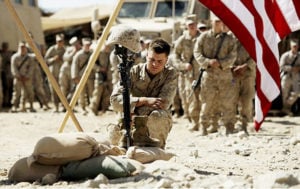
You may have heard that things are going poorly in Afghanistan. Is it true, maybe, maybe not. In either case, what you likely have not heard is any of this from President Obama. The President has spoken very little of the war in Afghanistan to the American public. From positive reports of progress to horrific incidents, the President speaks very little of the war. In the mean time, approval of the America’s participation in the war has dropped dramatically in recent months. According to a recent New York Times/CBS poll, Americans are more than dispirited about the war effort, they want out:
The survey found that more than two-thirds of those polled — 69 percent — thought that the United States should not be at war in Afghanistan. Just four months ago, 53 percent said that Americans should no longer be fighting in the conflict, more than a decade old.
What can you expect of a public that only hears news stories of America and NATO’s troubles in Afghanistan. If it bleeds it leads, that’s the way things are. What is missing is any leadership from the Oval Office. Americans are now only hearing the costs of being in Afghanistan. The ‘Why’ we are still there is not being answered. That job belongs to whoever is Commander in Chief of the war. Walter Russell Mead strongly made this point:
If the commander in chief doesn’t defend the war and make a case for his chosen strategy, the American public has little else to go on but the most garish of headlines. Afghanistan was supposed to be the “good war” that this administration wasn’t going to neglect as — it charged — the Bush administration had done. Yet today, the only thing coming from the Obama administration on the subject is radio silence.
We’ve said it before and we’ll say it again: the president has a duty to talk about the war — to explain to the American people why we are fighting, what we hope to accomplish, and why there is reason to believe that we can succeed. If the chosen strategy has run into obstacles, that is what war is about. Presidents are not infallible and war fighting involves flexibility and realism as well as courage and commitment. But the President seems to be conducting his administration as if the war weren’t happening. It is something to be swept under the rug, ignored, deprecated — and, on the current course, lost.
If President Obama thinks it best for the US to get out of Afghanistan then he needs to say so and do so. If, as his current strategy exists, he believes that having American forces fighting extremists, Al Qaeda, factions of the Taliban, and keeping the peace in Afghanistan is worth the costs, he needs to explain this to the American people. War is a serious business, and we need a serious leader. President Bush let the Iraq War dominate his presidency, in many ways to the detriment of the country and his political standing. But one thing is for certain, you knew where he stood. We understand that President Obama is more focused and naturally inclined to focus on domestic matters. But he is not a governor. He is the commander in chief and needs to act like one.